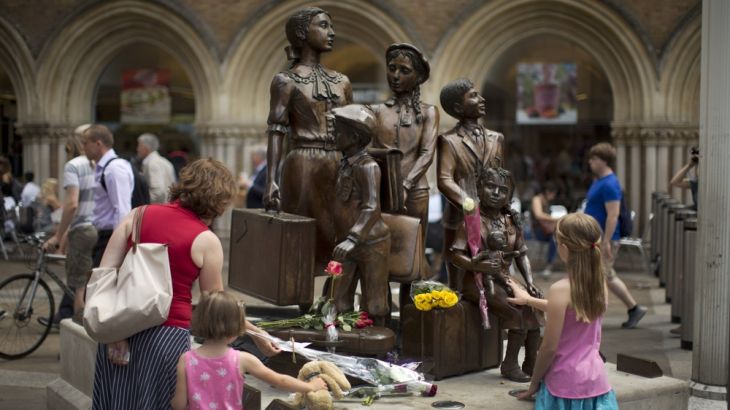UK marks 80th anniversary of kindertransport
Some 10,000 children fleeing persecution in Germany and occupied Eastern Europe arrived in Britain in 1938 and 1939.

By age 13, Harry Bibring had been forced out of his school and home, seen his father arrested, and witnessed the looting and destruction of the family business.
It was 1939 and Bibring was a Jew living in Vienna, Austria, which had been occupied by Nazi Germany a year earlier.
Keep reading
list of 4 itemsUN report charts lethal cost of migration over past decade
Conflict, climate, corruption drive Southeast Asia people trafficking: UN
Bodies of three Rohingya found as Indonesia ends rescue for capsized boat
After an outbreak of violence against Jews on November 9, 1938, known as Kristallnacht – the Night of the Broken Glass – Bibring’s parents decided to send him and his sister by train to a family friend in the UK.
“There were some 250 to 300 children boarding this train with parents who knew a lot more as to if or when they would see their children again … There was a lot of crying and screaming,” Bibring told Al Jazeera in an interview on Sunday to mark 80 years since the first children arrived in the UK.
Bibring was just one of an estimated 10,000 children who travelled to Britain between 1938 and 1939, fleeing the persecution of Jews and other minorities in Germany and occupied Eastern Europe.
The UK and other countries had been reluctant to accept refugee children and placed strict limits on the numbers permitted entry.
However, following Kristallnacht, public opinion turned and after a parliamentary debate on refugees on November 29, Britain agreed to take in Jewish children provided they would not be a burden on the state.
“I’ll never forget when the train pulled in on a misty morning to [London’s] Liverpool Street Station. Our noses were squashed up against the window to see what’s going on,” Bibring said.
According to the UK’s Imperial War Museum about half of the children were were placed with Jewish and non-Jewish families in foster homes, while the others lived in hostels or on farms.
While some found support and affection in their new homes, others were unhappy and struggled to adjust to a different culture and language.
“My big worry was that I couldn’t speak a single word of English,” said Bibring.
![Now 93, Bibring visits schools to warn against the dangers of prejudice and discrimination [Al Jazeera]](/wp-content/uploads/2018/12/90eb575692764c94914fbb9fc64ca3e2_18.jpeg)
In danger at home and abroad
The children were not exempt from danger in the UK, however, and many were evacuated to the countryside, along with other children, during the German bombing campaign known as the Blitz.
Bibring was separated from his sister and moved out of London. The two reunited years later and Bibring worked in various jobs before applying to join the RAF on his 18th birthday.
Despite passing the exams, his application was rejected as his mother was believed to be alive and living in enemy territory. If captured, the RAF reasoned, this could be used by the enemy to get information out of Bibring.
After meeting and marrying his wife Muriel in 1945, Bibring attended evening classes while working odd jobs and eventually qualified as an engineer.
Like most of the children who came on the kindertransport, Bibring never saw his parents again.
His father died of a heart attack in 1940 and his mother was killed in the Nazi-run Sobibor extermination camp in Poland.
“Everybody that arrived in Sobibor was dead in two hours,” Bibring said of the camp, where at least 170,000 people were murdered, according to the United States Holocaust Memorial Museum.
Millions still seeking safety
Now 93, Bibring visits schools to tell his story and warn against discrimination.
“I go around schools with the message that prejudice leads to discrimination, discrimination leads to a genocide, of which the Holocaust was the most severe in history, and that is something that needs to stop.
“In my book, there is only one race on this planet, it’s called the human race”.
“I think [the kindertransport is] the greatest thing the United Kingdom ever did and I’m sorry it’s not being repeated in other situations,” he said.
In 2016, the UK passed the Dubs Amendment, which aimed to allow 3,000 unaccompanied refugee children to come to the country.
The measure was championed by Lord Alfred Dubs, who had come to Britain as a refugee on the kindertransport, in response to the refugee crisis prompted by the Syrian Civil War.
However, the government was later much criticised after it was revealed in February 2017 that only 350 children had been accepted. Lord Dubs accused the government of going “back on their word”.
According to the United Nation‘s refugee agency, more than half of the world’s refugees are children. Many risk missing out on education and are vulnerable to trafficking, neglect or military recruitment.